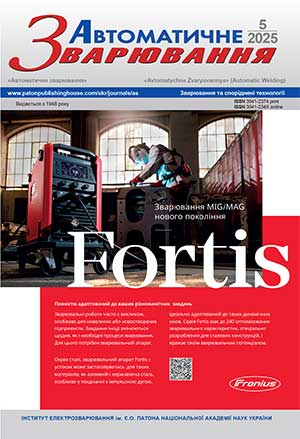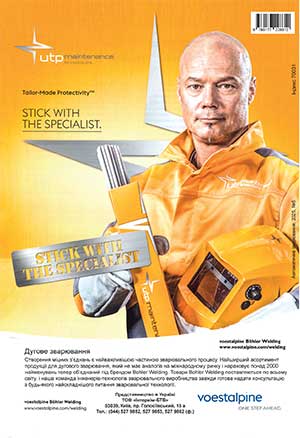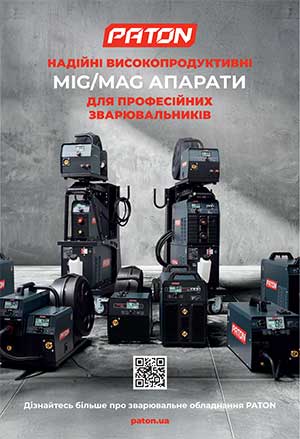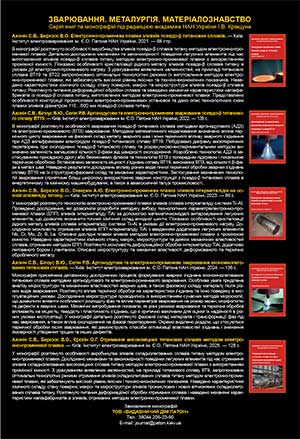| 2025 №05 (05) |
DOI of Article 10.37434/as2025.05.06 |
2025 №05 (07) |
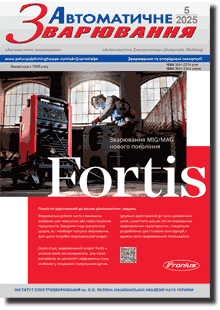
"Avtomatychne Zvaryuvannya" (Automatic Welding), #5, 2024, pp. 56-59
Mechanical properties of metal in areas of welded joints of mediumcarbon alloy steels heated to temperatures from 350 to 800 °C
V.D. Poznyakov, O.V. Korieniev
E.O. Paton Electric Welding Institute of the NAS of Ukraine 11 Kazymyr Malevych Str., 03150, Kyiv, Ukraine. E-mail: korenew@ukr.netDuring welding, two characteristic areas are formed in the heat-affected zone (HAZ) of welded joints of medium-carbon alloy steels with hardened (located in the HAZ areas of overheating, normalization and partial recrystallization – high-temperature area) and tempered (located mainly in the HAZ areas of recrystallization and blue brittleness – low-temperature area) metal. In welded joints made using manual arc and mechanized gas-shielded welding with small-diameter wires, the width of these areas can reach 2.5 and 8 mm, respectively. The technical literature is well-illustrated with regard to the influence of thermal cycles, characteristic for the high-temperature area of the HAZ, on the mechanical properties of the metal. There is much less information on the influence of thermal cycles of welding on the mechanical properties of the low-temperature area of the HAZ. This paper presents the data on the course of the heating and cooling process of the HAZ metal of butt welded joints 12 mm thick, which were heated to temperatures of 780, 550 and 350 °C, and on the effect of such heating on the mechanical properties (hardness, strength, ductility, impact toughness) of medium-carbon alloy steels with different content of alloying elements. 13 Ref., 2 Tabl., 2 Fig.
Keywords: medium-carbon alloy steels, mechanical properties, thermal cycles, alloying elements
Received: 02.06.2025
Received in revised form: 01.10.2025
Accepted: 13.10.2025
References
1. Tekin Özdemir (2020) Mechanical and microstructural analysis of armor steel welded joints. Intern. J. of Engineering Research and Development UMAGD, 12(1), 166-175. https://doi.org/10.29137/umagd.4881042. Konat, Ł., Białobrzeska, B., Białek, P. (2017) Effect of welding process on microstructural and mechanical characteristics of Hardox 600 steel. Metals, 7(9), 349. https://doi.org/10.3390/met7090349
3. Gaivoronskyi, O.A., Poznyakov, V.D., Zavdoveyev, A.V., Klapatyuk, A.V., Denisenko, A.M. (2023) Prevention of cold cracking in armour steel welding. The Paton Welding J., 5, 3-10. https://doi.org/10.37434/tpwj2023.05.01
4. Oskwarek, M. (2006) Structural features and susceptibility to cracking of welded joints of Hardox 400 and Hardox 500 steels. In: Proc. of the IV Students' Science Conf.: Human-Civilisation-Future, Wroclaw, Poland, 22-24 May 2006, Vol. 2, 115-120.
5. Cabrilo, A., Geric, K. (2016) Weldability of high hardness armor steel. Advanced Materials Research, 1138, 79-84. https://doi.org/10.4028/www.scientific.net/AMR.1138.79
6. Kuzmikova, L. (2013) An investigation of the weldability of high hardness armor steel. Faculty of Engineering, University of Wollongong. http://ro.uow.edu.au/theses/3853
7. Shchudro, A., Laukhin, D., Pozniakov, V. (2020) Analysis of the effects of welding conditions on the formation of the structure of welded joints of low-carbon low-alloy steels. Key Engineering Materials, 844, 146-154. https://doi.org/10.4028/www.scientific.net/KEM.844.146
8. Maksimov, S.Yu., Prilipko, O.O., Berdnikova, O.M., Alekseienko, T.O. et al. (2021) Controlling the parameters of the metal crystal lattice of the welded joints made underwater. Metalofizyka ta Novitni Tehnologiyi, 43(5), 713-723 [in Ukrainian]. https://doi.org/10.15407/mfint.43.05.0713
9. Poznyakov, V.D., Gajvoronskij, A.A., Kostin, V.A., Durachenko, V.V., Kostin, Yu.N. (2017) Features of austenite transformation and mechanical metal properties in the area of thermal influence of joints of 71 grade steel in arc welding. Mehanika ta Mashynobuduvannya, 1, 254-260 [in Russian]
10. Zavdoveev, A., Poznyakov, V., Baudin, T., Rogante, M. et al. (2021) Effect of nutritional values on the processing properties and microstructure of HSLA rod processed by different technologies. Materials Today Communications, 2, 102598. https://doi.org/10.1016/j.mtcomm.2021.102598
11. Konat, Ł., Białobrzeska, B., Białek, P. (2017) Effect of welding process on microstructural and mechanical characteristics of Hardox 600 steel. Metals, 7(9), 349. https://doi.org/10.3390/met7090349
12. Özdemir, T. (2020) Mechanical and microstructural analysis of armor steel welded joints. Intern. J. of Engineering Research and Development, 12(1), 166-175. https://doi.org/10.29137/umagd.488104
13. Sarzhevsky, V.A., Sazonov, V.Ya. (1981) Installation for simulating thermal cycles of welding based on the MCS-75 machine. Avtomaticheskaya Svarka, 5, 69-70 [in Russian].

